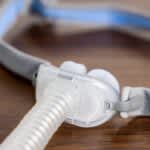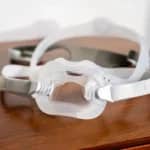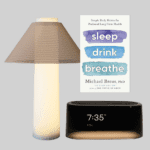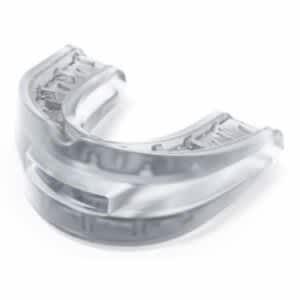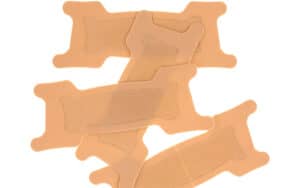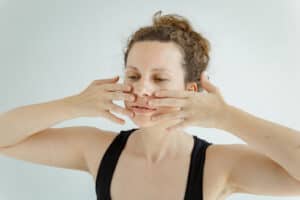Mouth exercises, also called myofunctional therapy, are movements that engage parts of the mouth, face, and throat to improve the mobility, function, and positioning of muscles that affect nighttime breathing.
Targeted mouth exercises may reduce snoring and improve your nighttime breathing. Although there are no established guidelines about the type and frequency of exercises needed to reduce snoring, studies have shown reductions in snoring with regimens of mouth exercises lasting from 8 to 30 minutes, practiced one or more times every day.
How Do Snoring Exercises Work?
Snoring happens when tissues in the upper airway vibrate against each other as a person breathes during sleep. Mouth exercises work by counteracting forces in the mouth and throat that contribute to snoring, like excessive sagging in the soft palate, open-mouth breathing, or a poorly positioned tongue during sleep.
Mouth exercises can be performed at home, but are often used under the instruction of a speech pathologist or another health care professional. Mouth exercises are considered an accessible, inexpensive, and non-invasive way to reduce snoring.
Although doctors don’t yet know who benefits most from these exercises, experts suggest that consistency may be key.
Mouth Exercises Using Your Tongue
Many mouth exercises involve engaging muscles of the tongue. These exercises are designed to help reposition the tongue in the mouth. This is helpful because the tongue can fall back towards the throat during sleep, which partially obstructs the airway and increases the likelihood of snoring.
- Tongue Sliding: Press the tip of your tongue to the roof of your mouth and slide it backward. Try 20 tongue slides several times a day.
- Tongue Suction: Suck your tongue up against the entire roof of your mouth, like a suction cup. Do this 20 times, repeating several times each day.
- Tongue Pressing: While keeping the tip of your tongue against the back of your bottom front teeth, press your tongue down against the floor of your mouth. Do 20 tongue presses multiple times throughout the day.
Mouth Exercises Using Your Face Muscles
Exercises for snoring may also target the muscles of the face. The goal of these exercises is to train the muscles that move the lower jaw and make the mouth less likely to fall open during sleep.
- Lip Squeeze: Press your lips together, like you’re trying to hold a straw in your mouth. Hold this position for several seconds, then practice repeating this motion in short bursts.
- Cheek Suction: Suck in the cheeks like you’re sucking on a straw, practicing both holding the position and repeating the movement several times in a row. For increased resistance, you can also practice contracting your cheek muscles while pressing against the inside of your cheek using a finger. Do this 10 times on each side.
- Smiling Exercise: Practice smiling and releasing by lifting and lowering the corners of your mouth. Start with one side of the mouth at a time, holding each side for a few seconds. Then, smile with both sides of your mouth at the same time for three sets of 10 smiles.
- Lateral Jaw Smiles: Move your jaw to one side, then alternate lifting each corner of your mouth. Hold this position, then move the jaw to the other side before alternating lifting each corner of the mouth.
Other Mouth Exercises
Other mouth exercises focus on strengthening and retraining muscles in the roof of the mouth and upper airway that can contribute to snoring.
- Vowel Pronunciation: Practice saying a vowel sound like “A” or “E”, both extending the sounds for a breath and repeating each sound in short bursts. Repeat this each day for 3 minutes.
- Balloon Blowing: Try blowing up a balloon without taking it out from between your lips. Start by taking a deep breath through your nose and then blow into the balloon five times through your mouth, continuing to hold the balloon in your mouth.
Is Your Snoring a Health Risk?
Answer three questions to understand if you should be concerned.
When to See a Doctor About Snoring
While snoring itself can be disruptive to bed partners, sometimes it’s a sign of more severe nighttime breathing issues. For this reason, anyone trying mouth exercises for snoring should also consult with a doctor.
Your doctor may evaluate whether your snoring is a sign of obstructive sleep apnea. Symptoms of obstructive sleep apnea that should prompt a visit to your doctor include:
- Stopped breathing, choking, or gasping during sleep
- Restless sleep
- Excessive daytime sleepiness
- Morning headaches
- Difficulty with mood or concentration
If snoring is not related to sleep apnea, a doctor may suggest improvements in your sleep hygiene, such as changing your sleep position, quitting smoking, losing weight, and reducing alcohol use prior to bed. Primary treatment options include using an oral appliance or continuous positive airway pressure (CPAP) therapy.
References
The Sleep Doctor Forum: Real Experiences, Real Connections
Continue the discussion on the Sleep Doctor Forum. Connect with experts and fellow forum members on CPAP, sleep apnea, and all things sleep. A priceless resource that’s free to join.



